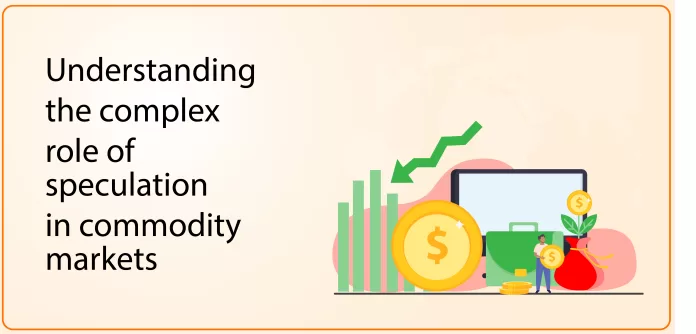The commodities market, often referred to as the financial marketplace where various raw materials or primary goods are bought and sold. These goods are known as commodities.
Defining Speculation in Commodity Markets
Speculation in commodity markets involves the trading of futures contracts, where participants, often referred to as speculators, speculate on the future price movements of various commodities. Unlike traditional investors, speculators do not possess physical commodities; rather, they trade contracts that grant them the right to buy or sell at predetermined prices and dates.
Motivation Behind Speculation
Speculators want to make money by predicting how commodity prices will change. They use smart tools to carefully study things like weather, global issues, and economic trends. Their goal is to make decisions that take advantage of these predictions, hoping to benefit from the ups and downs of the market.
Advantages of Speculation
- Enhanced Liquidity: Speculators, by increasing the number of active participants, contribute to a more liquid market. This heightened liquidity facilitates smoother market entry and exit for commercial players, ensuring a transparent price discovery process.
- Risk Mitigation through Hedging: They play a crucial role in providing hedging opportunities for commercial entities. For instance, a farmer concerned about falling crop prices can use futures contracts to lock in a guaranteed price, mitigating the risks associated with unpredictable market fluctuations.
- Efficient Price Discovery: Through constant analysis and trading activities, speculators contribute to more efficient price discovery. By reacting to changing market conditions, they create a feedback loop that nudges prices towards their true equilibrium level.
Read: Mastering Commodity Trading: Risk Assessment And Management
Challenges and Criticisms
- Heightened Volatility: Aggressive speculation has the potential to exacerbate price volatility. Sudden and extreme price fluctuations, driven by speculative activity, can disrupt markets, impacting producers, consumers, and the overall stability of the economy.
- Market Manipulation: While rare, concerns persist about the ability of speculators to manipulate markets through coordinated trading strategies. Such manipulation, if unchecked, can distort prices and have severe consequences for vulnerable populations dependent on affordable access to essential commodities.
- Resource Misallocation: Excessive speculation might divert resources away from productive endeavors, such as infrastructure development and research, potentially hindering long-term economic growth.
Conclusion
The role of speculation in commodity markets remains a subject of ongoing debate and analysis. Recognizing both the good and not-so-good parts of speculation and putting smart rules in place can help create a market that works well and stays strong. As we look ahead, doing more research, working together with experts, and sticking to fair trading practices are important to keep commodity markets healthy and stable worldwide. In this complex world of speculation, understanding how things work is vital for everyone involved in this always-changing global stage.


